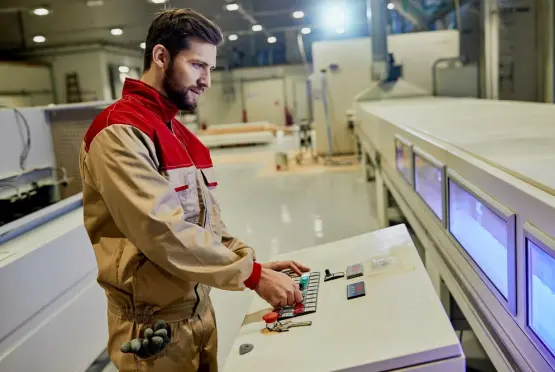
The desert air has helped Phoenix thrive as a manufacturing site for a number of industries that benefit from its location and climate: aerospace, semiconductor manufacturing, and renewable energy devices to name just a few. However, what is less clear for manufacturers is how to best partner with companies that precisely make the components inside each of these systems. At Colvin-Friedman, we’ve been the trusted partner for die-cutting since the dawn of the Electronics Age, and look forward to partnering with your company for any die-cutting needs.
Fill out the short form for a complete quote on a custom die-cut part. If you have any questions, call Colvin-Friedman Vice President Josh Rodman at (707) 769-4488.
| Aerospace & Defense - Needs and C-F Solutions | |
|---|---|
| Needs | C-F Solutions |
| Lightweight materials for thermal insulation and vibration damping | Specializes in cutting advanced materials like heat-resistant foams and composites for aerospace applications |
| Adherence to military and aerospace standards | Provides components that meet MIL-SPEC and other industry-specific standards |
| Semiconductor Manufacturing - Needs and C-F Solutions | |
|---|---|
| Needs | C-F Solutions |
| Precision components for chip fabrication equipment | Die cutting for cleanroom-grade materials like adhesives, films, and foams |
| High cleanliness and material compatibility standards | Tolerances as tight as ±0.005 inches for high-precision semiconductor needs |
| Renewable Energy - Needs and C-F Solutions | |
|---|---|
| Needs | C-F Solutions |
| Components for solar panels and energy storage | Expertise in thin-gauge plastics and composites for energy applications |
| Advanced material needs for energy efficiency | Solutions aligned with sustainable manufacturing practices |
| Manufacturing and Electronics - Needs and C-F Solutions | |
|---|---|
| Needs | C-F Solutions |
| Durable parts for industrial machinery and electronic housings | Expertise in cutting industrial-grade materials for rugged environments |
| Versatility for prototyping and custom runs | Flexible production capacity to accommodate custom, low-volume prototyping, and high-volume manufacturing |
Or call Josh at (707) 769-4488
When choosing a die-cutting partner, certain essential features and services are critical for success. Below is a summary of Colvin Friedman’s key strengths to assist in your evaluation:
| Aspect | Colvin-Friedman (C-F) | Foreign-Linked Suppliers (e.g., Mexico, China) |
|---|---|---|
| Communication | Real-time communication with minimal language barriers; direct access to senior staff. | Communication may involve language barriers, cross-border delays, or reliance on third-party liaisons, complicating issue resolution. |
| Compliance | Fully adheres to U.S. environmental, safety, and labor regulations; ensures reliability. | Regulatory adherence may vary; cross-border facilities might not meet U.S. standards, increasing risks for regulated industries. |
| Logistics & Lead Times | Ground shipping via the I-5 corridor ensures fast, reliable delivery; average lead time: 3 weeks. | Potential delays from customs and cross-border shipping; lead times may be longer, adding unpredictability to supply chains. |
| Transparency | All production occurs domestically, with clear accountability and no reliance on external facilities. | Partial production may occur abroad, obscuring full transparency and creating hidden risks in the supply chain. |
| Intellectual Property | Strong IP protection under U.S. law, safeguarding proprietary designs and processes. | Cross-border IP protections may be weaker, increasing the risk of theft or misuse of proprietary technologies. |
| Cost | Competitive pricing, especially when factoring in quality, logistics, and compliance. | Lower upfront costs may be offset by issues like delays, quality rework, or tariffs, ultimately reducing long-term value. |
When choosing a die-cutting partner, certain essential features and services are critical for success. Below is a summary of Colvin Friedman’s key strengths to assist in your evaluation:
| Capability | Details |
|---|---|
| Die Cutting Methods | Includes rotary, flatbed, steel rule, precision, industrial, kiss cut, and male-female stamping techniques. |
| Material Specialization | Skilled in processing materials such as thin-gauge plastics, foams, adhesives, metals, fabrics, composites, and medical-grade substrates. |
| Production Efficiency | Rotary machines: up to 40,000 units per hour; flatbed machines: 2,000 to 4,000 parts per hour, ensuring high output for demanding projects. |
| Precision Standards | Achieves tolerances as tight as ±0.005 inches for rotary methods and ±0.010 inches for flatbed processes, depending on the material used. |
| Maximum Dimensions | Rotary machines handle widths up to 16 inches, while flatbed systems accommodate widths up to 40 inches; thickness depends on the material. |
| Turnaround Times | Typical lead time is 3 weeks, with expedited options available to meet urgent project timelines. |
| Additional Offerings | Provides design consultations, prototyping support, material selection expertise, and inventory management integration. |